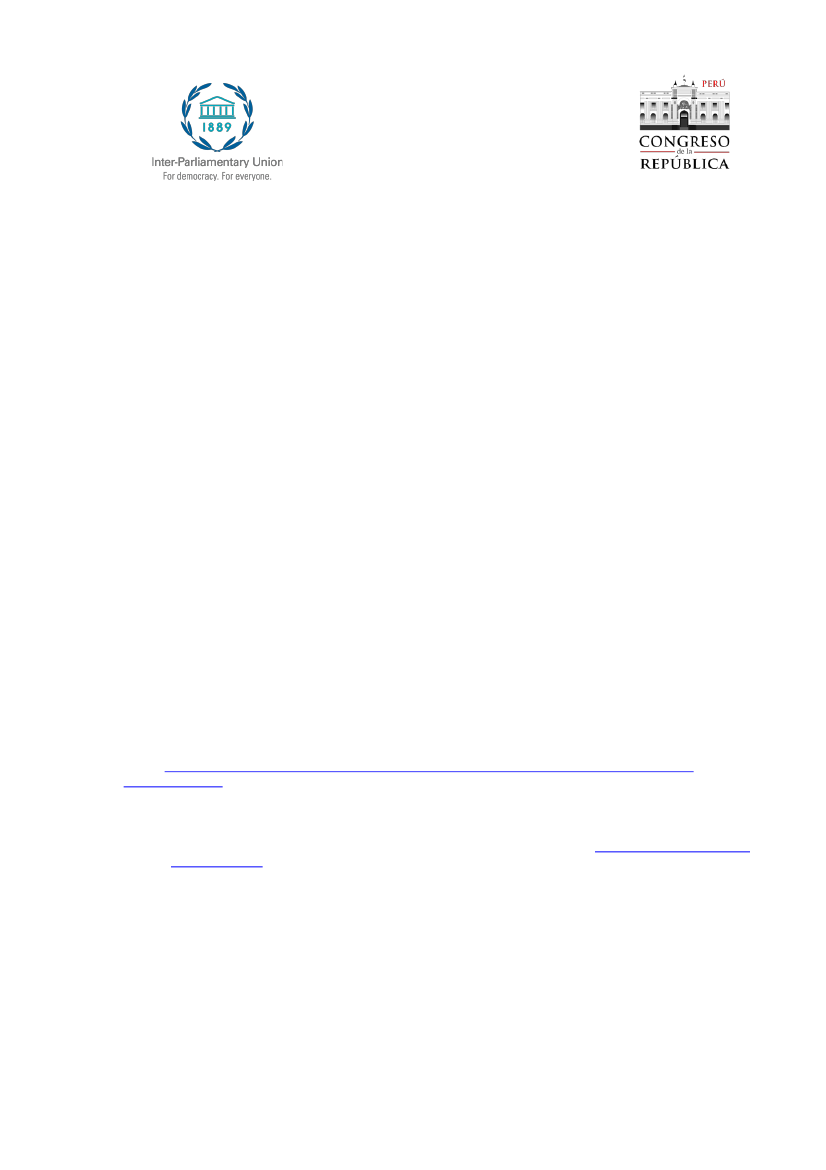
Eleventh IPU Global Conference of Young Parliamentarians
Uniting generations for gender equality
Lima, Peru, 11–13 September 2025
Outcome document
Co-Rapporteurs: Ms. Nour Abu Ghosh, Member of Parliament, Jordan, President of the IPU Bureau of
Young Parliamentarians; and Mr. Wilson Soto, Member of Parliament, Peru
Over 210 registered participants, including 120 parliamentarians from 44 countries, gathered in Lima from 11
to 13 September 2025 to reaffirm our commitment to gender equality, equity and parity, through inclusive,
intergenerational collaboration. The average age of the young parliamentarians was 34 years, and 50% of us
were women, reaching parity for the first time ever at this Conference. We were joined by representatives of
the Government of Peru, international organizations, civil society and experts, as well as Generation Equality
Forum leaders, and other women and youth leaders. We were also joined by the President of the Republic of
Peru, the President of the Council of Ministers of Peru, the President of the Congress of Peru, and the Vice-
President and Secretary General of the IPU. We warmly welcomed the participation of senior
parliamentarians and partners from the Women and Youth Democratic Engagement (WYDE) initiative.
The goal of gender equality, equity and parity is not new. It has spanned generations and remains a promise
to be fulfilled for the generations to come. We therefore examined it through an intergenerational lens. This
is timely: in 2025, the gender equality, equity and parity goal stands at a crossroads. Since the adoption in
1995 of the Beijing Declaration and Platform for Action, progress has been made, yet in recent years it has
been slowing on many fronts, and in some cases has even regressed. Across the globe, women have two-
thirds the legal rights of men. True 50:50 gender parity is still far from reach: only 27.2% of parliamentarians
worldwide are women, and this proportion grew only 0.3 percentage points last year. For young women, the
situation is disturbingly worse: only 1.2% of
the world’s
MPs are women aged 30 and under, a decrease of
0.2 points since 2023.
Gender parity drives concrete change in the daily lives of half the population and for society as a whole. For
example, countries
with more women in politics pass more laws enhancing women’s economic rights,
boosting their economic participation and prospects.
At this Conference, we sounded the alarm: backsliding on the participation of women and youth in political
decision-making is real and addressing it urgently needs to be prioritized. We therefore express our support
for the
plan of action on gender parity in parliaments adopted at the Global Conference of Women
Parliamentarians
in March 2025 and its implementation, as well as the implementation of General
Recommendation No. 40 of the Committee on the Elimination of Discrimination against Women (CEDAW).
To get us there, we call for:
•
•
The mobilization of MPs
–
especially male MPs
–
through the
IPU’s new
Achieving gender equality,
action by action
campaign, with commitments matched by concrete, robust and results-oriented
action.
Constitutional and legal reforms to ensure that parity is not subject to political will but is codified in
law. This includes through the use of equity measures, such as context-specific parity quotas, which
also take into account youth and groups in marginalized or vulnerable situations, to ensure not only
formal equality but also substantive political representation. Parity also means the inclusion of all
diverse groups. In addition to passing laws, we call for the accompanying institutions, programmes,
budgets and enforcement mechanisms to ensure that they are implemented.
The opening up of more opportunities for young women and men to take up office, including by
lowering the age of eligibility to align with the voting age, capping campaign spending and providing
equitable campaign opportunities and resources to women and young candidates.
•
Simply electing more women is not enough, we must also ensure parity in political leadership and influence,
and apply equity criteria for access to the most influential committees, so that women and young people can
overcome the structural barriers that have historically limited them. Globally, only 23.7% of Speakers of